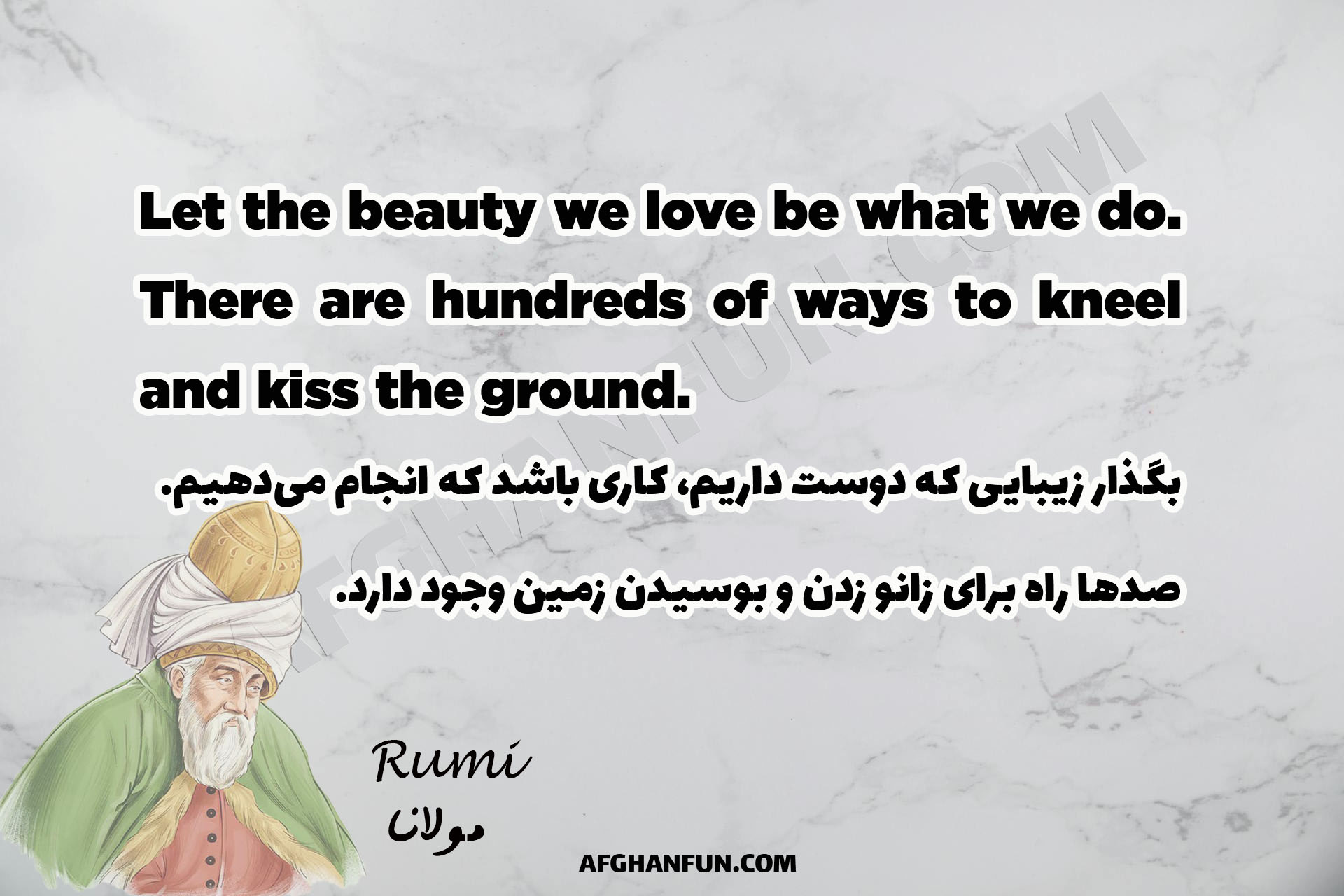Let the Beauty We Love Be What We Do: Rumi’s Message for a Meaningful Life
Let the beauty we love be what we do. There are hundreds of ways to kneel and kiss the ground.
Rumi
Rumi’s Call to Action: Let Your Love and Passion Shape Your Life
بگذار زیبایی که دوست داریم، کاری باشد که انجام میدهیم. صدها راه برای زانو زدن و بوسیدن زمین وجود دارد.
مولانا
این جمله از مولانا به این معناست که باید در زندگیمان بهگونهای عمل کنیم که زیباییها و ارزشهایی که دوست داریم، در اعمالمان تجلی پیدا کند. به عبارت دیگر، عشق و زیبایی باید به زبان عمل بیان شود. همچنین اشاره دارد که راههای زیادی برای نشان دادن عشق و احترام وجود دارد؛ مثلاً با زانو زدن و بوسیدن زمین.
Finding Beauty in Action: Rumi’s Quote to Transform Your Perspective
Биё, ки зебоии, ки мо дӯст медорем, кори мо бошад. Ҳазорон роҳ ҳаст, ки бар замин зону бигзарем ва бӯсаш кунем.
МАВЛОНО ҶАЛОЛУДДИН МУҲАММАДИ БАЛХӢ
Ин иқтибос моро даъват мекунад, ки зебоие ки дӯст медорем дар амалҳои худ инъикос кунем. яъне, зебоии ботинии худро дар амалҳои худ намоён созем. ҳамчунин, ба гуногунии роҳҳои ифодаи муҳаббат, эҳтиром ва ихлос ишора мекунад, ба ҳамон тавре ки мо метавонем ба роҳҳои гуногун саҷда кунем ва заминро бусем.
Rumi’s Timeless Advice: Let the Beauty You Love Define Your Life
دَعْ الجمالَ الذي نحبُه يكونُ ما نفعَلُه. هناكَ مئاتُ الطُّرقِ للركوعِ والتقبيلِ للأرض.
مولانا جلال الدینمحمد الرومي
هذه المقولة تعني أنه يجب علينا أن نُجسد الجمال والحب الذي نؤمن به في أفعالنا. بمعنى آخر، ما نحب من جمال وقيم يجب أن يظهر في تصرفاتنا. يشير مولانا إلى أن هناك العديد من الطرق للتعبير عن الحب والاحترام، وكل شخص يمكنه أن يجد طريقته الخاصة لتقديم هذا التعبير من خلال أعماله.
This quote by Rumi carries a deep philosophical and spiritual message, calling for alignment between our inner love or passion and the actions we take in the world. Here’s an analysis of the quote:
“Let the beauty we love be what we do.”
- Internal Beauty and External Action: Rumi suggests that the beauty we are drawn to, the beauty that moves us or inspires us, should manifest in the way we live our lives. The “beauty we love” isn’t just about an aesthetic appreciation of the world; it’s the deeper, more profound beauty—whether that’s love, truth, kindness, or creativity—that should guide our actions.
- Integration of Beliefs and Actions: Rumi emphasizes the unity between what we cherish (our values, ideals, and passions) and how we act. If we truly love something, our actions should reflect it. It is a call to live authentically, where our external actions align with our inner beliefs, desires, and feelings.
“There are hundreds of ways to kneel and kiss the ground.”
- Symbol of Devotion and Humility: Kneeling and kissing the ground are traditional symbols of reverence, humility, and devotion. In this context, Rumi uses these symbols to remind us that there are countless ways to express our devotion and humility in life. It’s not necessarily about a specific ritual or method, but rather about the attitude of reverence and surrender to the divine, to beauty, or to a higher purpose.
- Personal Expression of Reverence: The idea that there are “hundreds of ways” to kneel suggests that there is no single, correct way to show reverence or devotion. Each person may find their own unique path of expressing love, humility, and respect. This can apply to spirituality, but also to any form of passionate engagement in life—whether it’s through art, work, relationships, or service to others.
- Flexibility in Practice: Rumi encourages the idea that we don’t need to be confined to a rigid set of rules or practices when it comes to living a life of meaning or devotion. There are numerous ways to express love, reverence, and beauty. It’s an open invitation to explore and discover one’s own authentic way of connecting to what is sacred, beautiful, or meaningful.
Overall Message:
Rumi is pointing out that spirituality, beauty, and devotion are not just abstract concepts but should be embodied in everything we do. He encourages us to find ways to integrate what we love with our actions, suggesting that devotion and reverence can take on many forms, each unique to the individual. Whether it’s through art, work, relationships, or other aspects of life, we are invited to act in ways that reflect the beauty we cherish. The diversity of “ways to kneel and kiss the ground” reminds us that there is no one right path but an endless variety of ways to express our love for life, for others, and for the divine.
This quote is a call to live authentically, fully, and creatively, allowing our love and reverence to shine through in everything we do.











